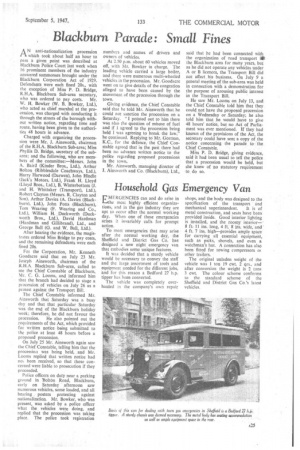, Blackburn Parade: Small Fines A N anti-nationalization procession which took
Page 27

If you've noticed an error in this article please click here to report it so we can fix it.
about half an hour to pass a given point was described at Blackburn Police Court last week when 16 prominent members of the industry answered summonses brought under the Blackburn Corporation Act of 1929. Defendants were each fined 20s., with the exception of Miss P. D. Bridge, R.H.A. Blackburn Sub-area secretary, who was ordered to pay costs. Mr. W. H. Bowl= (W. B. Bowker, Ltd.), who acted as chief marshal at the procession, was charged with conducting it through the streets of the borough without written notice, regarding time and route, having been given to the authorities 48 hours in advance.
Charged with organizing the procession were Mr. .1. Ainsworth, chairman of the R.H.A. Blackburn Sub-area; Miss Phyllis D. Bridge, secretary of the subarea; and the following, who are members of the committee:—Messrs. John A. Baird (Kinder Bros., Ltd.), Arthur Bolton (Ribblesdale Coachways, Ltd.), Harry Harwood (Darwen), John Hindle (Jack's Motors, Ltd.), Frank H. Lloyd (Lloyd Bros., Ltd.), B. Winterbottom. (J. and H. Whittaker (Transport), Ltd.), Robert Clayton (Messrs. R. Clayton and Son), Arthur Davies (A. Davies (Blackburn), Ltd.), John Potts (Blackburn), Tom Wearing (F. Wearing and Co., Ltd.), William H.. Duckworth (Duckworth Bros., Ltd., David Hardman (Hardman and Gillibrand), Ltd., and George Ball (G. and W. Ball, Ltd.).
After hearing the evidence, the magistrates ordered Miss Bridge to pay costs, and the remaining defendants were each fined 20s.
Fot the Corporation, Mr. Kenneth Goodacre said that on July 23 Mr. Joseph Ainsworth, chairman of the R.H.A. Blackburn Sub-area, called to see the Chief Constable of Blackburn, Mr. C. G. Looms, and informed him that the branch had decided to stage a procession of vehicles on July 26 as a protest against the Transport Bill.
The Chief Constable informed Mr. Ainsworth that Saturday was a busy day and that that particular Saturday was the end of the Blackburn holiday week; therefore, he did not favour the procession. He also pointed out the requirements of the Act, which provided for written notice being submitted to the police at least 48 hours before a proposed procession.
On July 25 Mr. Ainsworth again saw the Chief Constable, telling him that the processioa was being held, and Mr. Looms replied that written notice had not been received, so that those concerned were liable to prosecution if they proceeded.
Police officers on duty near a parking ground in 'Bolton Road, Blackburn, early on Saturday afternoon saw numerous vehicles, some loaded, and all bearing posters protesting against nationalization. Mr. Bowker, who was present, was asked by a police officer what the vehicles were doing, and replied that the procession was taking place. The police took registration numbers and names of drivers and owners of vehicles.
At 2,50 p.m. about 60 vehicles moved off, with Mr. Bowker in charge. The leading vehicle carried a large boiler, and there were numerous multi-wheeled vehicles in the procession. Mr. Goodacre went on to give details of the congestion alleged to have been caused by the movement of the procession through the town.
Giving evidence, the Chief Constable said that he told Mr. Ainsworth that he could not sanction the procession on a Saturday. " I pointed out to him there was also the question of misuse of fuel and if I agreed to the procession being held I was agreeing to break the law," he continued. Replying to Mr. Gorman, K.C., for the defence, the Chief Constable agreed that in the past there had been no advance written notice to the police regarding proposed procession§ in the town.
Mr. Ainsworth, managing director of J. Ainsworth and Co. (Blackburn), Ltd.,
said that he had been connected with the organization of road transport • the Blackburn area for many years, but as he did not operate any vehicles under A or B licences, the Transport Bill did not affect his business. On July 9 a general meeting of the sub-area was held in connection with a demonstration for the purpose of arousing public interest in the Transport Bill.
He saw Mr. Looms on July 13, and the Chief Constable told him that they could not have the proposed procession on a Wednesday or .Saturday; he also told him that he would have to give 48 hours' notice, but no Act of Parliament was ever mentioned. If they had known of the provisions of the Act, the secretary could have sent a copy of the notice concerning the parade tn. 'the Chief Constable.
Miss P. D. Bridge, giving evidence, said it had been usual to tell the police that a procession would be held, but she knew of no statutory requirement to do so,












































































